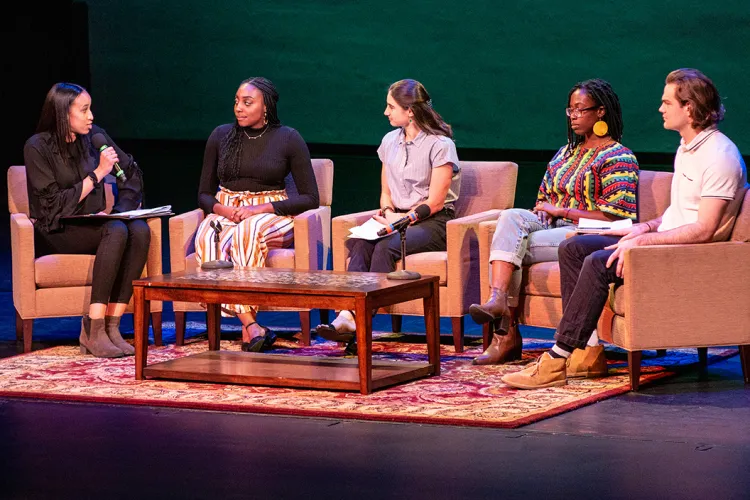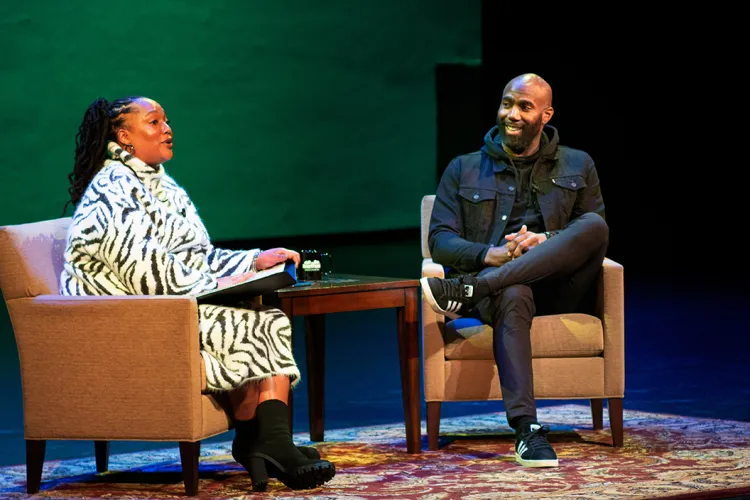Malcolm Jenkins cringes when people call him an activist.
“That’s not what I set out to be,” says the Philadelphia Eagles safety, who has made headlines for both his play on the field and his work in the community.
“But when you become conscious as a Black person in this country, activism comes as a sense of survival. There’s no way to know what’s going on and not be involved.”
That sentiment set the tone for Jenkins’s visit to Swarthmore on Feb. 21 for “Beyond the Field,” part of the College’s yearlong celebration of Black Excellence. Following a panel of student-athletes discussing the role of athletics in social change, Jenkins discussed his work in the realms of activism, athletics, and empowerment in the modern political era.
Jenkins first screened a trailer for his upcoming documentary, Black Boys, which seeks to “illuminate the unavoidable humanity of Black males in America.”
Emma Morgan-Bennett ’20, a women’s volleyball middle blocker and Marshall Scholar, then pondered why athletes take on the risk of facing criticism and punishment for “ushering political conversation to the athletic arena.”
“Perhaps because sports and the various teams which we declare as our communities in which we dedicate so much time, blood, sweat, and tears offer us microcosms where we affirm one another’s humanity, call one another sister, brother, teammate, irrespective of where we’ve come from, because we’ve got one another’s back, as long as we’re running to the same end goal,” said Morgan-Bennett, who helped bring Jenkins to campus.
“For me, that building of radical community is the notion of going beyond the field," she said.
Jenkins was joined onstage by Assistant Professor of Sociology and Black Studies Nina Johnson, who also works in the community to raise the level of public awareness of issues and inequality with the criminal justice system.
Johnson outlined Jenkins’s many efforts and initiatives, such as founding the Malcolm Jenkins Foundation in 2010, creating the Players Coalition, and fostering dialogue and change with police and government officials. For this and more, Jenkins earned the 2017 National Football League Players Association (NFLPA) Byron “Whizzer” White Award, the highest honor bestowed on NFL players, for his dedication to making a positive impact on his team and community.

Prior to the event, a panel of students discussed the role of athletics in social change.
“All of these different experiences, the people you meet, the things you learn, really make you who you are, sometimes even more so than academics,” said Jenkins. “And so, our foundation is really trying to plant seeds for the youth, to take them out of their own environments and put them in places that they wouldn’t necessarily have access to, hoping that it sparks something in themselves to see themselves in these spaces.”
Jenkins recalled a flashpoint for his views and advocacy for social justice: the 2016 shooting deaths of Alton Sterling and Philando Castile, which were followed by San Francisco 49ers quarterback Colin Kaepernick — and, eventually, other players, including Jenkins — making a statement and drawing criticism for kneeling during the national anthem before games.
“That spark was really just this awakening of, like, ‘OK, I’m not the only one who cares about these issues,’” said Jenkins. “There’s guys on almost every team passionate about issues affecting Black and brown communities, who want to get involved in a way that’s bigger than their own foundations. But we were doing that in silos, not pooling or sharing resources.”
The players came together and, through negotiations with the NFL, raised $89 million to give directly to organizations in need all around the country. But, just as important, they continued to use their platforms to voice support for the organizations and the (often thankless) work they do, and to educate the public on issues affecting communities of color.
“You have to be really patient, because everyone comes from their own lens of perspective, and what their experiences were growing up,” said Jenkins. “But I think the ability to educate people, especially people who don’t look like you, don’t think like you, have never heard these things, is so important.”
Later, Jenkins recounted his visit to Graterford State Correctional Institution, for which Johnson serves on a think tank examining the impact of mass incarceration. He said that despite being 6 feet and 204 pounds, walking into the “B block” of the prison with no security was a nerve-wracking experience. But after talking with six Graterford inmates serving life sentences since they were juveniles, Jenkins felt at ease, soaking up their insights and experiences.
“A lot of them really just wanted to be back out on the street,” to make a positive impact on people who look like them and are dealing with similar circumstances, Jenkins said. “It just dawned on me: Our capacity to change as humans is phenomenal.”
The event culminated in a Q&A session in which Joy George ’20, a Black studies and political science special major from the Bronx, N.Y., asked how Jenkins remains steadfast in doing the tough work of activism.
“It’s easy to get frustrated, things not moving as fast as I’d like them to,” Jenkins said. “But when you start to look at the people you’re actually effecting change for, I’m reminded that this is all bigger than me.
“I haven’t met anyone in this space that isn’t frustrated,” he added, “but I try to stay focused on the things we have accomplished, and the things we still want to do.”
This event was supported by the Department of Athletics, the Cooper Foundation, the Center for Innovation and Leadership, and the Office of Diversity, Inclusion, and Community Development.




